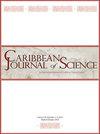Polychaetes (Annelida, Polychaeta) Associated with Mesophotic Coral Ecosystems in Puerto Rico and the U.S. Virgin Islands
IF 0.5
4区 生物学
Q4 BIODIVERSITY CONSERVATION
引用次数: 0
Abstract
Abstract Information about the taxonomy and ecology of polychaetes from Caribbean Mesophotic Coral Ecosystems (MCEs) is limited. To fill this information void, substrata samples were collected using technical diving from several mesophotic localities (between 40–91 m depth) in Puerto Rico and the U.S. Virgin Islands between 2007 and 2012. A total of 76 genera, distributed among 34 families, were identified. All genera have previously been reported from the Caribbean and from other marine ecoregions. Syllidae was the best-represented family across all sampled localities with the largest number of genera (15) and the highest number of individuals (5,755, or 80.85% of the total records). Haplosyllis was the most abundant and most frequently sampled genus in the sampled sites. Bajo de Sico, a mesophotic coral ecosystem (MCE) off the west coast of Puerto Rico, was the location with the highest abundances (1,183 worms), while the MCE of the extended insular shelf off La Parguera Natural Reserve on the southwest coast of Puerto Rico had the highest number of genera (59), perhaps related to higher sampling effort and its greater spatial heterogeneity. In our qualitative samples, the abundances and number of Polychaeta genera tended to be higher in the shallower sites (<60 m) than in the deeper ones (>60 m).波多黎各和美属维尔京群岛与中孔珊瑚生态系统相关的多毛纲(环节动物,多毛纲)
摘要关于加勒比海中光珊瑚生态系统中多毛类的分类和生态学的信息是有限的。为了填补这一信息空白,在2007年至2012年间,使用技术潜水从波多黎各和美属维尔京群岛的几个中生地区(深度在40–91米之间)采集了基质样本。共鉴定出76属,分布于34科。所有属以前都有来自加勒比海和其他海洋生态区的报告。Syllidae是所有采样点中代表性最好的科,属数最多(15个),个体数最多(5755个,占总记录的80.85%)。在采样点中,单叶石蒜属是数量最多、采样频率最高的属。波多黎各西海岸的中生珊瑚生态系统(MCE)Bajo de Sico是丰度最高的地方(1183种蠕虫),而波多黎各西南海岸La Parguera自然保护区外延伸岛架的MCE的属数最高(59种),这可能与更高的采样努力及其更大的空间异质性有关。在我们的定性样本中,Polychaeta属的丰度和数量在较浅的地点(60米)往往更高。
本文章由计算机程序翻译,如有差异,请以英文原文为准。
求助全文
约1分钟内获得全文
求助全文
来源期刊

Caribbean Journal of Science
综合性期刊-生物多样性保护
CiteScore
1.00
自引率
25.00%
发文量
21
审稿时长
>12 weeks
期刊介绍:
The Caribbean Journal of Science publishes articles, research notes, and book reviews pertinent to natural science of the Caribbean region. The emphasis is on botany, zoology, ecology, conservation biology and management, geology, archaeology, and paleontology. The mission as a nonprofit scholarly journal is to publish quality, peer-reviewed papers and to make them widely available.
 求助内容:
求助内容: 应助结果提醒方式:
应助结果提醒方式:


